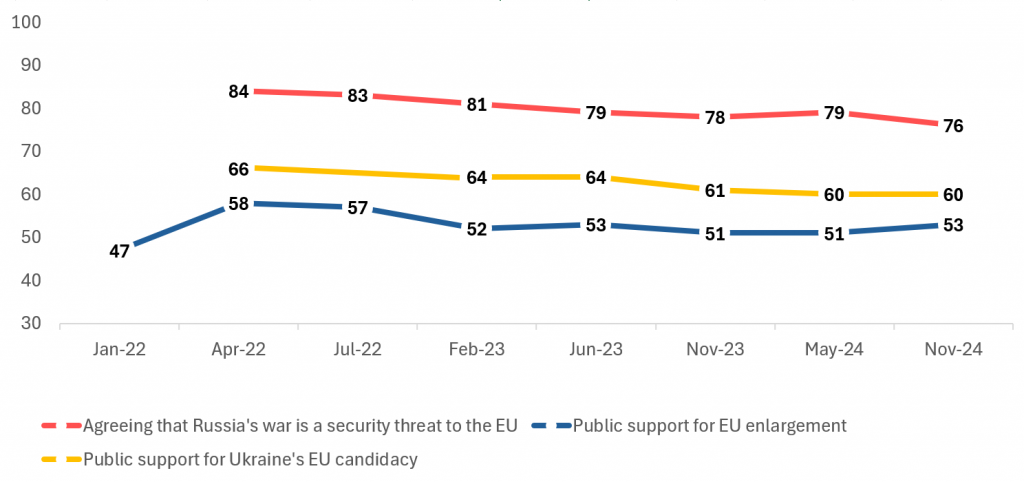Russian aggression in Ukraine triggered a surge in support for EU enlargement — but public goodwill is beginning to fade. Dmytro Panchuk argues that this moment of elite-public alignment is rare and fragile. To seize it, EU leaders must act decisively before war fatigue and populist rhetoric erode the case for widening
Russia’s full-scale invasion of Ukraine in February 2022 marked a turning point in the EU’s approach to enlargement. In an unusually swift and united response, the EU granted candidate status to Ukraine, Moldova, and later Georgia, while accelerating the accession process for the Western Balkans.
This institutional shift coincided with another, equally striking development: a surge in public support for enlargement. For the first time in decades — arguably in the EU’s history — it wasn't just political elites advocating for enlargement. Citizens across the Union, including in traditionally sceptical member states like France, Germany, and Italy, warmed to the idea of bringing new countries, especially Ukraine, into the fold.
Polling from 2022 showed a sharp rise in pro-enlargement sentiment across the EU. Support levels surpassed even those recorded during the 2004 'big bang' enlargement. This revealed not only strong backing for Ukraine’s accession, but more positive public opinion about other Eastern Partnership and Western Balkan countries, and even Turkey.
Citizens who view Russia as a threat are significantly more likely to support enlargement
While this pro-enlargement wave reflects solidarity with Ukraine and moral outrage at Russia’s aggression, the deeper driver appears to be geopolitical. More Europeans now see enlargement as a strategic necessity — a way to stand up to the Kremlin and reinforce the EU’s security and international role. Statistical analysis confirms the pattern: citizens who view Russia as a threat are significantly more likely to support enlargement, even when controlling for ideology, EU trust, and socioeconomic status.
Yet, the surge in public opinion has proven fragile. After peaking in 2022, citizen backing for EU widening began to level off in 2023–2024. Support for Ukraine’s candidacy stabilised around 60%, while overall support for enlargement settled just above 50%. This cooling trend closely mirrors a decline in perceived threat from Russia — down eight percentage points since April 2022. Across both EU-wide and national data, the pattern holds: as security anxieties recede, enthusiasm for enlargement wanes. This trajectory confirms that current support for enlargement is at least partially geopolitically driven. It is sensitive to shifts in Europe’s security environment, and to the ways in which political discourse and media coverage frame those shifts.

The EU must now seize a narrow window of opportunity. For once, enlargement ambitions at the elite level align with public sentiment. As earlier contributions in this series have noted, the geopolitical logic for widening is clear. What is less common — and potentially fleeting — is the democratic legitimacy that citizen support can lend to this strategic turn.
Institutional reforms and tangible progress in the accession process are necessary to match words with action
With more Europeans embracing enlargement as a response to the geopolitical threat from Russia, the European Commission and member states should move swiftly. Institutional reforms and tangible progress in the accession process are necessary to match words with action. Even some Eurosceptic and populist parties have tempered their rhetoric since 2022, suggesting that public pressure is, for now, containing opposition.
But this alignment is fragile. Russian disinformation campaigns are exploiting war fatigue, economic anxiety, and political fragmentation. Populist actors continue manipulating facts to stoke division and distrust. Without sustained public engagement, the current consensus on EU widening could easily unravel.
As Veronica Anghel has argued in this blog series, enlargement is not just a policy choice — it is the EU’s most powerful geopolitical tool. But making that case requires more than elite consensus. It demands broader advocacy — by policy-makers, researchers, and civil society — to explain why enlargement matters and how it strengthens the EU’s position in an increasingly contested world.
Giselle Bosse rightly notes that engaging citizens at grassroots level is essential, especially in member states where support for the EU remains fragile. That means countering disinformation, investing in civic dialogue, and connecting enlargement to everyday concerns.
EU enlargement is not just a policy choice — it is the EU’s most powerful geopolitical tool
Normative criteria must remain the long-term foundation of EU accession. But in the short term, geopolitical urgency should guide decision-making. As the US retreats from global leadership and Russia continues its overt and hybrid aggression against Europe, only deeper integration — not paralysis — can secure the EU’s future. Public opinion, for now, seems to grasp this. The challenge is to ensure it doesn’t slip away.